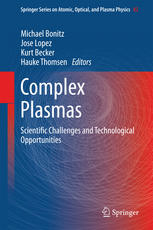

Most ebook files are in PDF format, so you can easily read them using various software such as Foxit Reader or directly on the Google Chrome browser.
Some ebook files are released by publishers in other formats such as .awz, .mobi, .epub, .fb2, etc. You may need to install specific software to read these formats on mobile/PC, such as Calibre.
Please read the tutorial at this link: https://ebookbell.com/faq
We offer FREE conversion to the popular formats you request; however, this may take some time. Therefore, right after payment, please email us, and we will try to provide the service as quickly as possible.
For some exceptional file formats or broken links (if any), please refrain from opening any disputes. Instead, email us first, and we will try to assist within a maximum of 6 hours.
EbookBell Team

4.8
64 reviewsThis book provides the reader with an introduction to the physics of complex plasmas, a discussion of the specific scientific and technical challenges they present and an overview of their potential technological applications.
Complex plasmas differ from conventional high-temperature plasmas in several ways: they may contain additional species, including nano meter- to micrometer-sized particles, negative ions, molecules and radicals and they may exhibit strong correlations or quantum effects. This book introduces the classical and quantum mechanical approaches used to describe and simulate complex plasmas. It also covers some key experimental techniques used in the analysis of these plasmas, including calorimetric probe methods, IR absorption techniques and X-ray absorption spectroscopy.
The final part of the book reviews the emerging applications of microcavity and microchannel plasmas, the synthesis and assembly of nanomaterials through plasma electrochemistry, the large-scale generation of ozone using microplasmas and novel applications of atmospheric-pressure non-thermal plasmas in dentistry.
Going beyond the scope of traditional plasma texts, the presentation is very well suited for senior undergraduate, graduate students and postdoctoral researchers specializing in plasma physics.